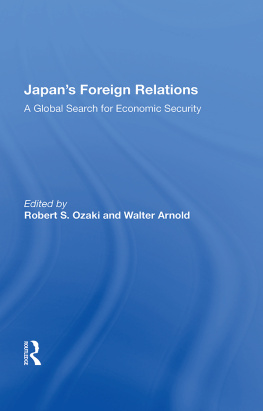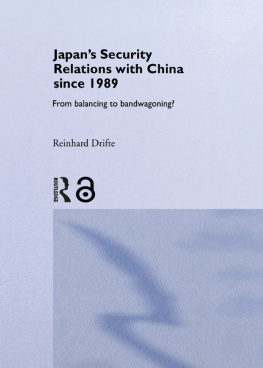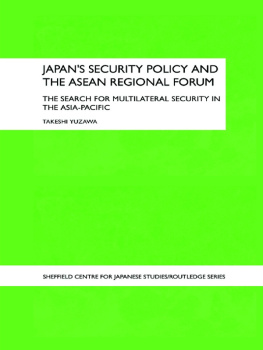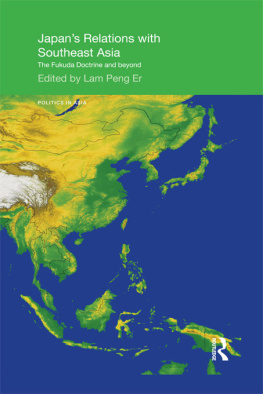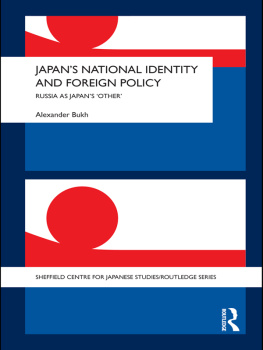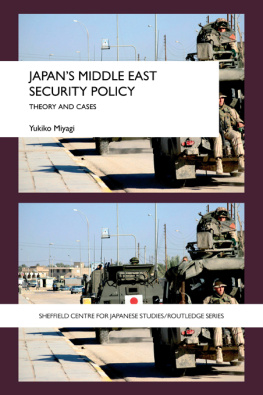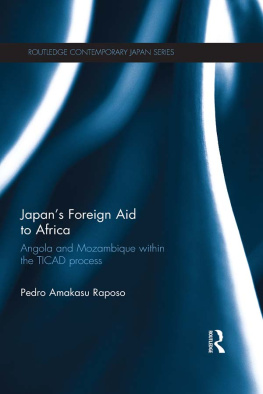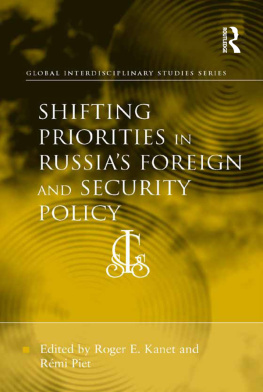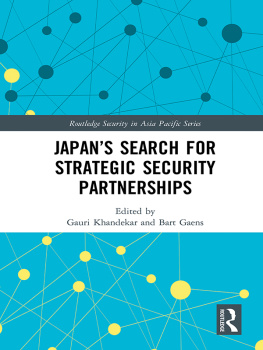Also of Interest
Japan and the New Ocean Regime , Robert L. Friedheim, George O. Totten III, Haruhiro Fukui, Tsuneo Akaha, Masayuki Takeyama, Mamoru Koga, and Hiroyuki Nakahara
The Modernizers: Overseas Students, Foreign Employees, and Meiji Japan , edited by Ardath W. Burks
Japan: A Postindustrial Power , Second, Updated Edition, Ardath W. Burks
Japans Economy: Coping with Change in the International Environment , edited by Daniel I. Okimoto
The Hidden Sun: Women of Modern Japan , Dorothy Robins-Mowry
The Japanese Diet and the U.S. Congress , edited by Francis R. Valeo and Charles E. Morrison
The Fragile Entente: The 1978 Japan-China Peace Treaty in a Global Context , Robert E. Bedeski
The United States and Japan in the Western Pacific: Micronesia and Papua New Guinea , Grant K. Goodman and Felix Moos
Japan and the United States: Economic and Political Adversaries , edited by Leon Hollerman
How Japan Innovates: Comparison with the U.S. in the Case of Oxygen Steelmaking , Leonard H. Lynn
The Security of Korea: US. and Japanese Perspectives on the 1980s , edited by Franklin B. Weinstein and Fuji Kamiya
The Sogo Shosha: Japans Multinational Trading Companies , Alexander Young
Available in hardcover and paperback.
Westview Special Studies on East Asia
Japans Foreign Relations: A Global Search for Economic Security
edited by Robert S. Ozaki and Walter Arnold
After World War II, Japan reemerged in the arena of international relations as an almost exclusively economic power without military might or territorial ambitions. Within some thirty years it transformed itself from a semideveloped state to a technological superpower with an economy that today is the second largest in the free world, next only to the United States, accounting for over 10 percent of total global production. The management of a rapidly growing industrial state with little domestic supply of resources necessarily requires great skill in the difficult task of maintaining sufficient access to overseas markets to sustain internal economic activity. Not surprisingly, then, Japans foreign relations from World War II to the present have been heavily conditioned by economic considerations.
This collection of original articles investigates how the economic growth of Japan has affected the pattern of its foreign relations and where and to what extent economic principles have had to be compromised for political, legal, cultural, or ideological reasons. The contributors, experts on Japans economy, politics, and foreign relations, analyze the state of Japans foreign relations with North America, the EC, Oceania, the Soviet Union, COMECON, China, ASEAN, the Middle East, Latin America, Africa, Korea, and Taiwan, focusing on developments in the last seven years and predicting likely trends in the 1980s.
Dr. Robert S. Ozaki is a professor of economics at California State University, Hayward. His publications include The Control of Imports and Foreign Capital in Japan (1972), The Japanese (1978), and Amerikajin to Nihonjin (Americans and Japanese) (1980). He has served on the advisory editorial board of the Journal of Asian Studies and as a Fulbright-Hays lecturer in Japan. Walter Arnold is an assistant professor of political science at Miami University He has published articles and reviews in Canadian Review of Studies in Nationalism, Der Betriebsoekonom, and the Annals of the American Academy of Political and Social Science.
First published 1985 by Westview Press
Published 2018 by Routledge
52 Vanderbilt Avenue, New York, NY 10017
2 Park Square, Milton Park, Abingdon, Oxon OX14 4RN
Routledge is an imprint of the Taylor & Francis Group, an informa business
Copyright 1985 by Taylor & Francis
All rights reserved. No part of this book may be reprinted or reproduced or utilised in any form or by any electronic, mechanical, or other means, now known or hereafter invented, including photocopying and recording, or in any information storage or retrieval system, without permission in writing from the publishers.
Notice:
Product or corporate names may be trademarks or registered trademarks, and are used only for identification and explanation without intent to infringe.
Library of Congress Cataloging in Publication Data
Main entry under title:
Japans foreign relations.
(Westview special studies on East Asia)
Papers presented at the 35th Annual Meeting of the
Association for Asian Studies, held March 25, 1983, in
San Francisco.
Includes Index.
1. JapanForeign economic relationsCongresses.
2. JapanForeign relations1945Congresses.
I. Ozaki, Robert S. II. Arnold, Walter, 1946-
III. Association for Asian Studies. Meeting (35th: 1983
: San Francisco, Calif.) IV. Series.
HF1601.J376 1985 337.52 84-13069
ISBN 0-86531-778-X
ISBN 0-86531-779-8 (pbk.)
ISBN 13: 978-0-367-01649-4 (hbk)
The objective of this volume is to investigate how the economic growth of Japan has affected the pattern of its foreign relations and to examine where, and to what extent, the principles of economic complementarity have had to be compromised for political, legal, cultural, or ideological reasons. The central theme of the book is that the trends and issues in Japans foreign relations have been overshadowed by the adjustment problems in the process of integration of its domestic economy with the world market.
After World War II Japan reemerged in the arena of international relations as an almost exclusively economic power without military might or territorial ambitions. Its economy grew at a phenomenal rate from the mid-1950s until the oil crisis of 1973. Even after the oil crisis its overall economic performance was much better than that of the other industrial nations in the West. In the short span of some thirty years Japan transformed itself from a semideveloped state to a technological superpower, a rare event in the annals of world economic history. Today it is the second-largest economy in the free world, next only to the United States, accounting for over 10 percent of total global production.
Japans economic expansion is striking because the country is small and mountainous, without industrial resources. The management of a rapidly growing industrial state with few domestic resources is a difficult and precarious art, requiring the cultivating and maintaining of sufficient access to overseas markets to sustain the dynamics of internal economic activity. To pay for imports of vital industrial materials Japan must export enough of its manufactured products: Export or expire has been its fate, dictated by the structural properties of its economy.

